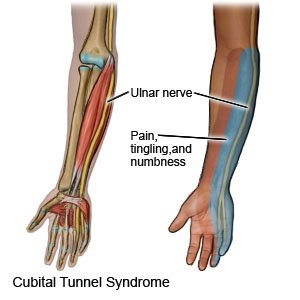Cubital Tunnel Syndrome
Medically reviewed by Drugs.com. Last updated on Aug 4, 2025.
AMBULATORY CARE:
Cubital tunnel syndrome
is a condition that causes pressure to build on the ulnar nerve in your elbow. The ulnar nerve controls muscles and feeling in the hand. Cubital tunnel syndrome may be caused by direct pressure, stretching, or decreased blood flow to the ulnar nerve.
 |
Common signs and symptoms include the following:
- Numbness and tingling in your arm or hand, usually in the ring and little fingers
- Pain in your elbow that extends into your forearm and hand
- Weakness in your hand and fingers
- Not being able to straighten your fingers, usually the ring and little fingers
Seek care immediately if:
- You suddenly lose feeling in your hand or fingers.
- You cannot move your ring or little finger.
Related medications
Call your doctor or orthopedist if:
- Your symptoms get worse.
- Your hand and fingers are so weak that you cannot grab, squeeze, or lift items.
- You have questions or concerns about your condition or care.
Treatment
may not be needed. If your symptoms continue, you may need any of the following:
- NSAIDs help decrease swelling and pain or fever. This medicine is available with or without a doctor's order. NSAIDs can cause stomach bleeding or kidney problems in certain people. If you take blood thinner medicine, always ask your healthcare provider if NSAIDs are safe for you. Always read the medicine label and follow directions.
- A steroid injection helps decrease pain and swelling.
- Surgery may be needed if your symptoms do not get better within 3 months. Surgery will take pressure off your ulnar nerve. Your surgeon may move your nerve to a different area to stop it from being stretched or pinched. He or she may remove part of your bone if it is pressing on your nerve.
Treatment options
The following list of medications are related to or used in the treatment of this condition.
Manage your symptoms:
- Do not put pressure on your elbow. Certain positions put pressure on the ulnar nerve in your elbow. Do not lean on your elbow. Do not sleep with your arm overhead and elbow bent. Go to sleep with your arm straight and by your side.
- Apply ice. Ice helps decrease swelling and pain and prevents tissue damage. Use an ice pack or put crushed ice in a plastic bag. Cover the bag with a towel before you place it on your skin. Apply ice for 15 to 20 minutes every hour, or as directed.
- Rest your arm. Avoid activities that cause your symptoms to allow your nerve to heal.
- Go to physical therapy as directed. A physical therapist can show you exercises to help improve movement and strength. Physical therapy can also help decrease pain and loss of function.
- Use an elbow splint or brace. The brace or splint helps decrease arm movement and keep pressure off your ulnar nerve. Your healthcare provider will tell you when and how long to wear it each day. You may need to wear it at night. You may also need elbow pads to protect your elbow.
Follow up with your doctor or orthopedist as directed:
Write down your questions so you remember to ask them during your visits.
© Copyright Merative 2025 Information is for End User's use only and may not be sold, redistributed or otherwise used for commercial purposes.
The above information is an educational aid only. It is not intended as medical advice for individual conditions or treatments. Talk to your doctor, nurse or pharmacist before following any medical regimen to see if it is safe and effective for you.
Learn more about Cubital Tunnel Syndrome
Treatment options
Care guides
Further information
Always consult your healthcare provider to ensure the information displayed on this page applies to your personal circumstances.
